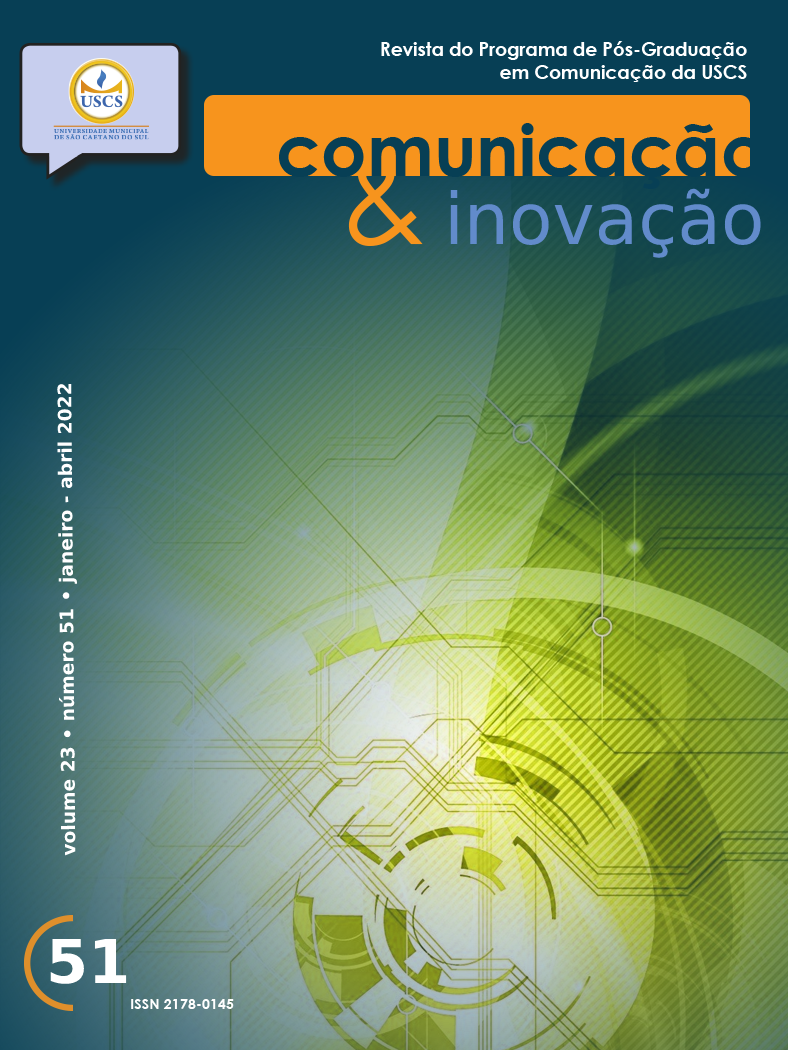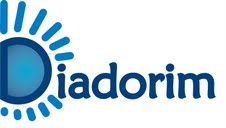O poder técnico-informacional do Whatsapp em tempos de covid-19
DOI:
https://doi.org/10.13037/ci.vol23n51.8299Palavras-chave:
espaço, sociot'écnico, whatsapp, informação, poderResumo
O artigo apresenta o Whatsapp, enquanto meio técnico-informacional, passível de controle e instrumentalização política. O aplicativo é interpretado em sua dimensão sociotécnica a fim de compreender a dinâmica de produção e circulação de conteúdo textual. Para tanto, no início da pandemia acompanhamos no aplicativo 63 grupos bolsonaristas. A investigação revela um sofisticado mecanismo de controle sistemático da informação, que se manifesta pela natureza e pelas fontes das informações que circulam e que são compartilhadas com a ativa participação dos membros dos grupos. Operaria, assim, um tipo de poder mais sedutor que repressor, que mediante o apoio sociotécnico tornaria a racionalidade política populista mais sofisticada.
Downloads
Referências
ALLCOTT, H.; GENTZKOW, M. Social Media and Fake News in the 2016 Election. Journal of Economic Perspectives, v. 31, n. 2, p. 211-236, 2017. Disponível em: <https://web.stanford.edu/~gentzkow/research/fakenews.pdf >. Acesso em: 5 nov. 2019.
BAPTISTA, E.; ROSSINI, P.; OLIVEIRA, V.; STROMER-GALLEY, JENNIFER. A circulação da (des)informação política no WhatsApp e no Facebook. Revista do Programa de Pós Graduação em Comunicação PPGCOM-UFJF, Juiz de Fora, v. 13, n. 3, p. 29 a 46, dez. 2019.
BELL, E.; OWEN, T. The Platform Press: how silicon valley reengineered journalism. Tow Center for Digital Journalism, 2017. Disponível em: <https://www.cjr.org/tow_center_reports/platform-press-how-silicon-valley-reengineered-journalism.php>. Acesso em: 29 mar. 2018.
BELLI, L.. WhatsApp skewed Brazilian election, proving social media's danger to democracy. The Conversation, 5 dezembro de 2018. Disponível em: <https://theconversation.com/whatsapp-skewed-brazilian-election-proving-social-medias-danger-to-democracy-106476 >. Acesso em: 30 nov. 2019.
CARDOSO, B.; EVANGELISTA, R. O vírus segundo o WhatsApp: desinformação e morte no Brasil de Bolsonaro. [S.I], Lavits, 2020.
Disponível em: <https://lavits.org/o-virus-segundo-o-whatsapp-desinformacao-e-morte-no-brasil-de-bolsonaro/?lang=pt >. Acesso em: 30 nov. 2020.
CESARINO, L. Populismo digital: roteiro inicial para um conceito, a partir de um estudo de caso da campanha eleitoral de 2018. [S.l.: s.n.], dez. 2018. Disponível em: <https://www.academia.edu/38061666/Populismo_digital_roteiro_inicial_para_um_conceito_a_partir_de_um_estudo_de_caso_da_campanha_eleitoral_de_2018_manuscrito>. Acesso em: 30 mar. 2020.
CESARINO, L. On digital populism in Brazil. The journal of the Association for Political and Legal Anthropology, 2019. Disponível em: <https://polarjournal.org/2019/04/15/on-jair-bolsonaros-digital-populism/>. Acesso em: 18 de setembro de 2019.
CHAGAS, V.; MODESTO, M.; MAGALHÃES, D. O Brasil vai virar Venezuela: medo, memes e enquadramentos emocionais no WhatsApp pró-Bolsonaro. Esferas, Brasília, n. 14, p. 1-17, 2019. Disponível em: <http://dx.doi.org/10.31501/esf.v0i14.10374 >. Acesso em: 10 fev. 2020.
COMMISSÃO EUROPEIA. Information Disorder: Toward an interdisciplinary framework for research and policy making. [S.I.], set. 2017. Disponível em : <https://rm.coe.int/information-disorder-toward-an-interdisciplinary-framework-for-researc/168076277c >. Acesso em: 10 fev. 2020.
EVANGELISTA, R. Mentiras lucrativas: modelos de negócio da web exploram radicalismos e ameaçam democracias. Revista Eletrônica de Jornalismo Científico. Campinas. Dossiê 210, 2019. Disponível em: <http://www.comciencia.br/ mentiras-lucrativas-modelos-de-negocio-da-web-exploram-radicalismos-e-ameaçam-democracias/ >. Acesso em: 10 fev. 2020.
GERBAUDO, P. Social media and populism: an elective affinity? Media, Culture & Society, 40, 5, p.1-9, maio 2018. Disponível em: <https://journals.sagepub.com/doi/10.1177/0163443718772192 >. Acesso em: 10 mar. 2020.
GHEDIN, R.; DIAS, T.; RIBEIRO, P. V. Granas por cliques. Fake news a R$ 25 mil por mês: como o Google treinou e enriqueceu blogueiros antipetistas. The Intercept Brasil, nov. 2019. Disponível em: <https://theintercept.com/2019/11/19/fake-news-google-blogueiros-antipetistas/>. Acesso em: 10 fev. 2020.
GRAMSCI, A. Quaderni del carcere. Turim: Einaudi, 1975.
LACLAU, E. A Razão Populista. 1º Edição, São Paulo: Três Estrelas, 2013.
MACHADO, C.; KIRA B.; HIRSCH, G.; MARCHAL, N.; KOLLANYI, B.; HOWARD, N, P; LEDERER, T.; BARASH, V. News and Political Information Consumption in Brazil: Mapping the First Round of the 2018 Brazilian Presidential Election on Twitter. Computational Propaganda Project, 05 Outubro, 2018.
MAGENTA, M.; GRAGNANI, J.; SOUZA, F. How WhatsApp is being abused in Brazil's elections. BBC, 24, Outubro 2018. Disponível em: https://www.bbc.com/news/technology-45956557. Acesso em: 30 jan. 2020.
MANN, D.; SUTTON, M.; TUFFIN, R. The Evolution of Hate: Social Dynamicsin White Racist Newsgroups. Internet Journal of Criminology, 2003. Disponível em <http://irep.ntu.ac.uk/id/eprint/10080/>. Acesso em: 30 jan. 2020.
NARAYANAN, V.; BARASH, V., KELLY, J, KOLLANYI, B, NEUDERT, L, M, HOWARD, P, N. Polarization, Partisanship and Junk News Consumption over Social Media in the US. Oxford Internet Institute, Feb. 2018.
HOWARD, P. N.; WOOLLEY, S.; R. CALO. Algorithms, bots, and political communication in the us 2016 election: the challenge of automated political communication for election law and administration. Journal of Information Technology & Politics, pp. 1-13, Apr. 2018.
NIELSEN, R, K; NEWMAN, N; FLETCHER, R; KALOGEROPOULOS, A. Digital News Report, 2019. Oxford, UK: Reuters Institute for the Study of Journalism, 2019. Disponível em: <https://reutersinstitute.politics.ox.ac.uk/our-research/digital-news-report-2019 >. Acesso em: 5 nov. 2019.
PARISER, E. O filtro invisível: o que a internet está escondendo de você. Rio de Janeiro: Zahar, 2012.
PINCH, T.; BIJKER, W. The Social Construction of Facts and Artifacts: Or How the Sociology of Science and the Sociology of Technology Might Benefit Each Other. In: Pinch, T. & Bijker, W and Highes, T, P. The Social Construction of Social. New direction in the Sociology and Technology. Cambridge, MIT Press, p. 11-44.
RESENDE, G; MELO, P.; SOUSA, H.; MESSIAS, J.; VASCONCELO, M.; ALMEIDA, J.; BENEVENUTO, F. (Mis)Information Dissemination in WhatsApp: Gathering, Analyzing and Countermeasures. Trabalho apresentado na IW3C2 (International World Wide Web Conference Committee). May, 2019. Disponível em: <https://doi.org/10.1145/3308558.3313688 >. Acesso em: 30 fev. 2020.
SANTOS, M. Técnica, Espaço, Tempo: Globalização e Meio Técnico-Científico-Informacional. 1990, São Paulo: Editora da Universidade de São Paulo.
SCHEUFELE, D. A.; KRAUSE, N. Science audiences, misinformation, and fake news. Proceedings of the National Academy of Sciences. 2019, [s.l.], v. 116, n. 16, p. 7662-7669. Disponível em: <https://www.pnas.org/content/116/16/7662 >. Acesso em: 3 nov. 2019.
TOMAÉL, M. I.; ALCARÁ, A. R.; SILVA, T. E. Fontes de Informação na Internet: critérios de qualidade. In: TOMAÉL, M. I. (Org.) Fontes de Informação na Internet. Londrina : EDUEL, 2008. Cap. 1, p.3-28.
Organização das Nações Unidas para a Educação, a Ciência e a Cultura (UNESCO). Jornalismo, Fake News e Desinformação. Manual para Educação e Treinamento em Jornalismo. Paris, 2019.
VALERIANI, A.; VACCARI, C. Political talk on mobile instant messaging services: a comparative analysis of Germany, Italy, and the UK. Information. 2017, Communication & Society, v. 21, n. 11, p.1-17. Disponível em: <https://www.tandfonline.com/doi/abs/10.1080/1369118X.2017.1350730>. Acesso em: 3 nov. 2019.
VOSOUGHI, S., ROY, D.; ARAL, S. The spread of true and false news online. Science, 2018. 359 (6380), pp. 1146-1151. DOI: 10.1126/science.aap9559. Acesso em: 30 out. 2019.
WINNER, L. Do artifacts have politics?, 1980. Daedalus, 109(1), 121-136.
We Are Social and Hootsuite. Global Digital Overview, 2020. Disponível em: <https://wearesocial.com/digital-2020
Downloads
Publicado
Edição
Seção
Licença
Direitos autorais (c) 2022 Lalita Kraus, Alan Meira, Matheus Barbosa

Este trabalho está licenciado sob uma licença Creative Commons Attribution-NonCommercial-NoDerivatives 4.0 International License.
Conforme consta nas normas da revista, o envio de artigos e textos solicitando a apreciação com a finalidade de publicação na Comunicação & Inovação, configura a cessão de direitos autorais.
No caso de fotos e imagens, o autor deve providenciar documento que ateste a permissão em termos de direitos autorais.





